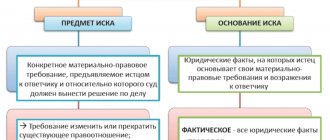From privatized From municipal Other nuances
Read our articles about whether it is possible to deregister a person to nowhere, how to deregister a person without knowledge who has not lived there for a long time and does not pay bills, how to deregister a deceased or disabled person, and also about whether it is possible to deregister an ex-husband or wife after divorce.
Is it possible to?
Is it possible to stop the registration of a convicted person?
It is possible to cancel the registration of a convicted person who lived at a given address before his arrest and subsequent stay in prison.
The discharge of citizens, including convicted persons, is carried out in accordance with the requirements of the following legislative acts :
- Decree of the Government of the Russian Federation No. 713 of July 17, 1995 “Registration Rules...”;
- Administrative Regulations of the Federal Migration Service, approved by Order of the Federal Migration Service of the Russian Federation dated September 11, 2012 No. 288 (as amended on January 19, 2015);
- Law of the Russian Federation No. 5242-1 of June 25, 1993
The main requirement in each of these state laws is the personal desire of citizens to have or stop registering at their address.
The rights of convicts are observed especially biasedly: increasing the number of people without a fixed place of residence is unacceptable; on a national scale these are impressive figures. That is why it is unlikely that it will be possible to circumvent the laws , even among legally savvy relatives themselves.
Find out on our website whether you will be able to check out if you have debts on utility bills, how to check out and register at the same time in another apartment, as well as how to check out while in another city, and whether it is possible to deregister by proxy without a personal presence.
How to discharge a convicted person?
Who is prohibited from being discharged by law?
According to the law, any citizen of the Russian Federation can be discharged if he is capable, sane and of age. However, there is a certain category of citizens who are prohibited by law from being evicted from their apartment, even if they or the fact of their registration causes inconvenience. This:
- Owners of minimal shares who took advantage of the opportunity of fictitious registration.
- Not the owners who live in the living space by testamentary refusal. The testator could set such a condition - residence in the apartment of third parties, in addition to the recipients of the inheritance.
- A person who refused privatization. At the same time, the owner can deregister such a citizen if he proves that the person registered has lived at a different address for many years.
- Former spouse, if the marriage contract provides for his residence while searching for other housing.
- A minor who was sent to an orphanage. The child retains registration in the parental apartment.
- Persons without a fixed place of residence. Without an alternative place of residence, they are discharged only in the event of deprivation of parental rights from an apartment owned by the child. This is the case when the court’s decision is influenced by the life circumstances of the registered person.
Family ties matter only in the latter case. Divorce and contestation of parenthood mean the loss of a family connection. The testator, in turn, can bind the recipient in relation to any person.
De-registration options
There are two options:
- in agreement with the person serving his sentence;
- without approval.
The first method is quite realistic and is suitable for those who maintain normal human relations with the person in custody, but want to pay utility bills only for citizens who are actually currently living in the residential premises.
The second option is possible if the housing is in municipal ownership, and the trial has already taken place and the decision has gained legal force.
In this case, the registration will be canceled, but only for the period of the prison term.
In general, there are a lot of situations, and the subtleties of legal procedures depend on the status of the convicted person (in relation to property rights to housing and the degree of relationship), as well as on whether the person participated in privatization or refused it, etc.
In the vast majority of cases, discharge is possible only through the court (Article 7 of the Law of the Russian Federation No. 5242-1 of June 25, 1993).
You can learn about how to apply for an extract from an apartment through the MFC or the State Services portal, as well as what documents are required for the procedure.
Rights of property owners
In order to expel a registered person from the house, the owner should know his rights.
The grounds for eviction may be such regulatory acts of the Civil Code of the Russian Federation as:
- №292;
- №209;
- № 288.
The law also states that the owner must first try to resolve the issue peacefully. During the trial, evidence will be required to show that an amicable settlement was attempted with the defendant. Such standards do not apply to persons who do not have at least shared ownership of a given living space.
Privatized property
In the context of private real estate, which has already become the property of a specific citizen, it is quite possible to write a person out of the house if he does not live there. The court will need to provide papers that confirm this fact. The grounds must be supported by documents. If the resident finds arguments that he cannot lose his registration, the claim will be denied.
Municipal housing
Voluntary deregistration has a simple algorithm of actions:
- You need to come to the passport office, the MFC, or fill out an application through State Services.
- Re-register for another living space on the basis of Article No. 20 of the Civil Code of the Russian Federation.
The situation is more complicated when a person does not agree with the intentions of municipal employees. Collection of documentation will be required in the case of state real estate. Such a house is on the city or regional balance sheet, and only representatives of government agencies are authorized to demand the release of the resident.
Scheme for registering a person depending on the form of ownership
But even so, the trial can become more complicated if the citizen has nowhere to go. The most favorable development of events for the municipality is that the person will receive a deferment to find a new home and will be accommodated, but a little later. Negative outcome of the case - the judge has the right to reject the request of government bodies if infringement of the citizen’s interests is proven.
Donated house
Private houses are often passed on by inheritance or through a deed of gift. During such transactions, everyone who was registered in the property has every right to live there, even after a change of owner. Only the new owner will be able to deregister persons if there are valid reasons.
How to apply?
First of all, you should find out what papers will be needed and where it is best to apply. If a person is in prison, then the procedure is allowed to be carried out without presence (FMS Order No. 208 of 2007).
You can complete this procedure in one of the institutions:
- FMS;
- MFC;
- passport department at the housing department.
The only difference is the timing: the fastest result will be obtained if you go directly to the territorial division of the FMS, since in this case time will not be wasted sending papers to the migration service and back.
From the history of the issue
In the Soviet Union the problem was solved simply . Article 60 of the RSFSR Housing Code asserted the right of a tenant to be absent for six months. If he was absent longer, the housing was subject to alienation .
There were, of course, exceptions to the rules, but they concerned persons serving military service, or those whose long-term absence was caused by work.
The convicts did not enjoy this privilege, and it turned out that many of them simply lost their housing.
At some point, this law was considered contrary to the Constitution. In fact, it was an additional punishment for a person who had already served his sentence, which led to the Resolution of the Constitutional Court of the Russian Federation No. 8-P of July 23, 1995. It stated that from now on, deprivation of liberty cannot be a basis for deprivation of housing.
This is also reflected in the Housing Code, Article 71 of which states that the temporary absence of the tenant of the living space does not entail loss of the right to use.
Required documents
The mere consent of those in the camp for those serving time is not enough, although it is precisely the determining factor for success. The following documents will be needed:
- application in form No. 6;
- passport;
- court sentence.
The application form can be downloaded from the Internet or from a passport officer, you can even fill it out, but the person who has violated the law must put his own signature.
The passport is usually confiscated upon arrest, and it is kept by the administration of the institution.
Therefore, a copy of the prisoner’s passport and a signed application must be certified by the head of the zone or a substitute person with his signature and seal of the institution.
A more difficult task is to obtain a copy of the judgment . You can pay a visit to the office of the court where the trial was held, or directly to the judge, or to the secretary with a request for the issuance of this document.
Usually, indirect participants in the process are denied a copy of the court decision, but, as a last resort, the person serving the sentence himself has the right to receive such a document upon his request and will be able to give it to his family member.
Timing and cost
For the convenience of citizens, the work of the bodies authorized to carry out registration actions is structured in such a way that documents are accepted in a single window , and this is where a set of papers should be submitted.
The period for processing the cancellation of registration cannot last more than 3 days after submitting the application (clause 22 of the Administrative Regulations).
Since the service for terminating the validity of a residence permit is a state service, when it is provided by bodies specially authorized for this purpose payment for the provision of such a service is not required , and in this case there is no state duty.
Procedure
Below we provide a detailed algorithm of actions that need to be carried out for discharge in two situations - if the convicted person agrees to be discharged and if not.
By consent
When contacting the passport office to terminate the registration of a prisoner, you must submit the following documents to the specialist:
- Identification document of the person being deregistered. This is a copy of the convict’s passport, certified by the seal of the correctional institution and the signature of the chief.
- An application filled out on a special form and certified in the same way as a copy of the passport. The form can be obtained from a passport office employee. Anyone can fill out the application directly, but the convicted person must personally sign it. To do this, you will have to visit the institution where he is serving his sentence.
- A copy of the verdict. The procedure for obtaining a copy is quite complicated. It can be obtained both from the convicted person and from the court that made the decision. It may be difficult to obtain it in court. since the court issues a verdict only to the participants in the process.
All documents are submitted to a single window of the Department of Internal Affairs of the Ministry of Internal Affairs of the Russian Federation for the reception of citizens.
Authority employees may require the personal presence of the person being discharged. Such actions are illegal and should be appealed in court.
After your application, the passport office employees must cancel the registration of a person imprisoned in the MLS within no more than three days.
Without agreement
When applying to the court to unilaterally discharge a person who is in MLS, you need to perform the following series of actions:
- File a claim. The best option for this would be to contact a qualified lawyer. A specialist will help you fill out your application and advise you on any questions you may have. But you can do this yourself.
- Attach the necessary documents to it: a copy of the verdict, an extract from the house register, a copy of the passport of the person being discharged, a copy of your passport, a certificate of home ownership or a social tenancy agreement;
- Appear in court to participate in the hearing. The court, based on the facts presented and the documents provided, will consider the case and make a decision. It can be either positive or not satisfying the plaintiff’s demands.
- After receiving a satisfactory decision from the judicial authority, contact the department of the Internal Affairs Directorate of the Ministry of Internal Affairs of the Russian Federation at the place of residence of the convicted person to make changes to the register of residents.
What will they give out?
Since the relative of the prisoner does not have the original passport in hand, and a copy was submitted, the stamp on deregistration at the place of former registration will be placed only on the second copy of the departure sheet .
This will be the result of the discharge.
If after this procedure you take a certificate from the place of residence , then the prisoner’s surname will no longer appear on it, since the deregistration operation has been carried out in the automated database and in all accounting papers.
What are the reasons?
Most often, they are discharged in order to save themselves from the need for utility payments , because sometimes the terms of imprisonment can be very long.
However, other scenarios are also possible. Various changes occur in the life of the relatives of the convicted person, which sometimes require the sale or exchange of housing.
It may also be that the convicted person turns out to be by no means the most pleasant person and the relatives simply want to protect .
In all these cases, the convicted person may meet the family halfway , or he may refuse to do so, so a lot of nuances that arise give rise to a huge number of questions related to the need and possibilities of deregistering a person serving a sentence.
Features of the procedure
The issue regarding the cancellation of the registration of a person in prison has many nuances.
From privatized
What is important here is whether the person serving the sentence owns a share in the privatized real estate. If this citizen is the owner, then he can be deregistered either with or without consent, only the second case can be implemented exclusively through the court.
After the person’s release, his rights will be restored by renewing his registration, but he was and will remain the owner, and without participation, no transactions with this real estate are possible.
If a person who committed a crime and was punished for it with a prison term was free and present during privatization, but issued a refusal in favor of the owner, then even if the owner of the place of residence changes, this citizen will have the right to use the residential premises (clause 4 of article 31 of the Housing Code RF). In this case, there is only one option for discharge - of your own free will.
In a situation where privatization was carried out after the arrest, and the convict did not participate in it, having refused, then it is possible to cancel the registration, but only for the period of stay in places that are not so remote. The right to use housing upon return is retained .
From the municipal
This option is the simplest (read about the discharge from municipal housing of a person who does not live in it).
Without the consent of the person in the camp, it is also possible to deregister in a municipal apartment, but you just need to get a copy of the court verdict.
But there is one limitation: registration is liquidated only for the duration of imprisonment , and then must be restored.
Having canceled the registration of a prisoner at the residential address, relatives can sell it (read about registration for sale), exchange it, but this will not help get rid of a tenant with a criminal past: he will achieve registration in the newly acquired residential premises.
Options for releasing a person who is in prison
Is it possible to discharge a person from his apartment if he is in prison?
Yes, but there are not many options and they are not always simple:
- Extract at your own request. In some cases, if the relationship is trusting, there is peace and quiet in the family, the convicted person can easily make this concession.
Some resort to some kind of agreement, and then the person is easier to meet halfway. But this is not always possible. - Through the court. This option becomes the only way out if no persuasion helps or if relatives do not even want to try to come to an agreement with the convicted person.
IMPORTANT! A convicted person can be discharged without his consent only for good reasons. In the USSR, for a long time, laws were practiced according to which a prisoner was left completely without housing.
Today the opposite is true - legislation carefully ensures that people released from prison do not lose the right to a place of residence during their absence.
This is associated with many problems that arise when buying and selling real estate.






